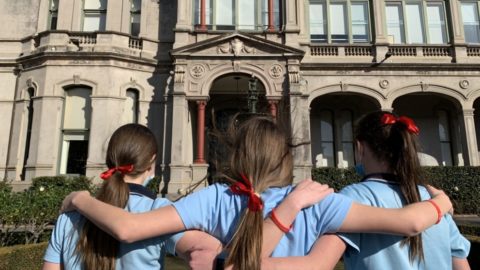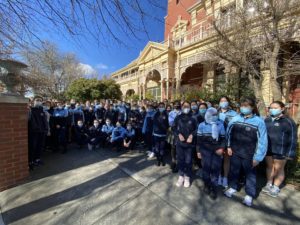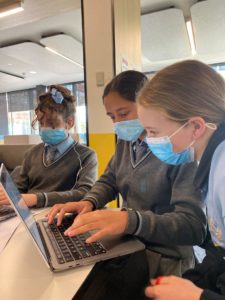From the Head of Year 7 – A Call to Action

A Call to Action
A happy by-product of the most recent lockdowns has been the distraction from COVID-19 through some very stirring Olympic performances. Should you have also found yourself willing an athlete to the line sooner by cheering audibly at your television (obviously making a marked addition to their campaign despite the fact that they are competing over 8,000 kilometres away), you will no doubt have been entertained by an array of joyous moments from these Games.
I have several ‘key Olympic moments’ in mind, though it must be said, as the Head of Year 7, it was the dais of three teenage skateboarders Sakura Yosozumi, 19 years old, Kokona Hiraki, 12 years old and Sky Brown, 13 years old, after the Women’s Park event that caught my attention. Not only were they amongst the youngest medallists at an Olympic Games, but their joy, support and genuine admiration of each other throughout the competition was something to behold. It was so clear throughout both the competition and post competition interviews that these three strong young women wanted to effect change. Change to how others saw skateboarding, to inspire young women to be brave. To remind us that age is no barrier to influence. As the Bronze medallist, Sky Brown said, “I hope I inspire some girls. People feel like ‘I’m too young – I can’t do it.’ But honestly, if you believe in yourself you can do anything.” This is a message I hope resounds with teenagers everywhere.
Empathy
Adolescence is a time where the executive functioning skills of the brain controlling such things as decision making, self-control and planning, are only at a developing stage in the early teenage years (Good, Jasmine & Fox, Jon & Coffen, Ronald, 2011).
Related to these is the development of empathy in all of its forms; cognitive, affective and compassionate. Cognitive empathy is the ability to understand how a person feels and what they might be thinking (Bariso, 2018). Possessing cognitive empathy greatly enhances a person’s communication skills. Affective empathy is the ability to share the feelings of another person. This helps us build connections with others. Finally, it is compassionate empathy that goes beyond simply understanding others and compels us to take significant action to effect change (Goetz, Jennifer & Keltner, Dacher & Simon-Thomas, Emiliana, 2010).
Not only does the development of compassionate empathy in adolescents lead to improved educational outcomes in the classroom (Laird, 2015), but in a world littered with moral and ethical ambiguity, it is essential for ethical, engaged and action-oriented citizens to take a role in society (Misco, 2014).
As educators we believe that lived experiences are a powerful tool to build empathy in our community. By hearing the stories of others, a greater depth of empathy is realised and students are often inspired to action to create change (Yilmaz, 2007).
Use Your Voices Project and the Compass Award
At St Catherine’s School, we recognise the importance of empathy and the development of this within each child. Two exciting initiatives have commenced this year to further enhance this. The Use Your VOICES Project led by the Student Representative Committee and facilitated by Mr James Brown, aims to develop a sense of Voice, Ownership, Inclusion, Compassion, Empowerment and Strength in our students. Cross age discussions, arguing ideas and exploring concepts between student representatives occurs so that proposals for change can be enacted. A move for sanitary items in the bathrooms was a focus during Semester 1 and developing greater connection and interaction between all St Catherine’s students was raised as a priority earlier this term. In using this platform, the project seeks to provide students with power to influence change, regardless of age or stage in the secondary setting.
The Compass Award is designed for students from 10 to 13 years of age. It precedes the Duke of Edinburgh Award and looks to develop initiative, commitment, responsibility and motivated young people. An integral part of this program is volunteering so that students develop engagement and connection with their community and a sense of compassionate empathy to spur on action. It has been pleasing to see a number of our students begin to take part in this initiative from the Senior School and we look forward to hearing of their experiences throughout the program.
Year 7 Students Generating Compassionate Empathy
As the Olympics have demonstrated, a student voice can never be found too soon. Regardless of age, the capacity for action and development of compassionate empathy exists and should be nurtured.
 During Semester 2 we have seen compassionate empathy on vivid display from various Year 7 students. Late last term Kari Prendergast (Year 7) spoke courageously to students in Years 7 and 8 about Cystic Fibrosis and the journey of those who suffer with this debilitating illness. This is because it is her lived experience. Not only did she educate each of us during her speech, she also arranged a walk-a-thon at the start of term to raise funds for Cystic Fibrosis Community Care, an organisation which she tells us “has helped me so much.”
During Semester 2 we have seen compassionate empathy on vivid display from various Year 7 students. Late last term Kari Prendergast (Year 7) spoke courageously to students in Years 7 and 8 about Cystic Fibrosis and the journey of those who suffer with this debilitating illness. This is because it is her lived experience. Not only did she educate each of us during her speech, she also arranged a walk-a-thon at the start of term to raise funds for Cystic Fibrosis Community Care, an organisation which she tells us “has helped me so much.”
Whilst I acknowledge all of Kari’s hard work in leading this event, the collective display of compassionate empathy from students in Years 7 and 8, from engagement and interest in Cystic Fibrosis during the presentation and beyond, to the energy and swell of support for this cause in the lead up to the event and at the walk-a-thon was outstanding.
 Similarly, the Write a Book in a Day competition, undertaken by the Years 7 and 8 English Honours classes and their illustrators fed this same call to action. Toiling for 10 hours, the students worked tirelessly to produce a book for young people undergoing cancer treatment in hospitals. In addition, they were able to gain generous donations in the form of sponsorship for the Kids’ Cancer Project, a national charity supporting childhood cancer research.
Similarly, the Write a Book in a Day competition, undertaken by the Years 7 and 8 English Honours classes and their illustrators fed this same call to action. Toiling for 10 hours, the students worked tirelessly to produce a book for young people undergoing cancer treatment in hospitals. In addition, they were able to gain generous donations in the form of sponsorship for the Kids’ Cancer Project, a national charity supporting childhood cancer research.
Whilst the donations, $731 and $1,550 respectively are fantastic, it must be noted this development of compassionate empathy has in fact not just come in the form of money or charity, but a call to action.


